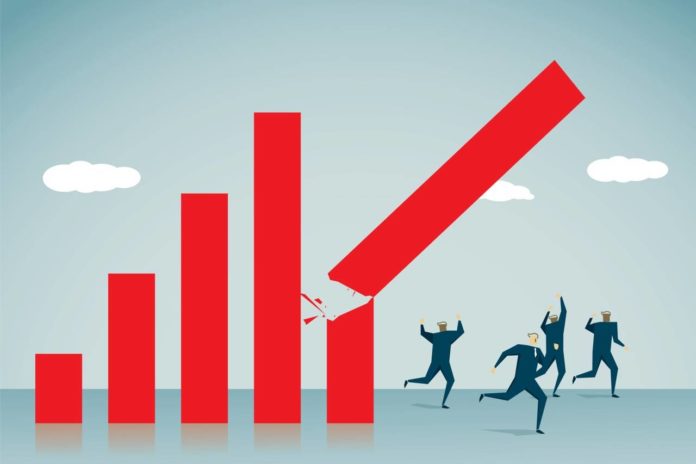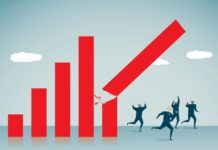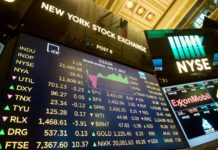You can hear it everywhere in the mainstream media – “The sky is fall-” . . . err, “There’s going to be a recession in 2020.”
Let me tell you a little “secret.”
Yes, there’s going to be a recession and a stock bear market. You don’t need journalists or economists to tell you that.
But they don’t know when. They just refuse to admit it.
I don’t know either.
And having economists set a date for 2020 actually makes me feel optimistic about next year – because, according to history, the big economic collapses come when everybody except (maybe) a few crusty old men believe the economy is just hunky-dory and the Dow Jones is going to grow to the sky.
The Business Cycle
In textbook business and economics, entrepreneurs and investors start companies and produce goods and services. It’s rough at first, but times get better.
Companies hire more employees. Those employees buy more goods and services. And so companies expand to supply those goods and services. They take out loans, confident they’ll make more than enough money in profits to pay the loans off.
And, for some years, they’re right. The share prices of those companies keeps going up because the companies keep growing sales and profits.
What can go wrong?
Plenty, and eventually, it does. Companies take on too much debt and make over-optimistic business decisions. They can’t sell their inventories. Business slows down. Companies pull back. They fire employees, who then stop buying goods and services, and so the downtrend speeds up.
Stock investors get scared, so they sell off the shares they own, causing the market to crash.
However, applying this model to the economy in 2019 too simplistically is like believing your savings account is in Joe’s house. We’re not in Bedford Falls anymore.
The general psychology is valid because people do cycle between greed and fear, but how it plays out changes regularly with governmental policies, advances in technology, what’s happening in other countries, interest rates, energy production, and on and on.
It’s true the current bull market began in March 2009, the low point of the 2008-2009 Financial Crash.
That’s now over 10 1/2 years ago, and therefore, by all historical measures, this bull market is old.
However, every cycle is different because the world keeps changing.
Therefore, nobody can give a timetable for future events – especially economists.
Irving Fisher was a Great Economist in the First Half of the 20th Century
But that’s not why he’s most remembered.
In September 1929, he wrote: “Stock prices have reached what looks like a permanently high plateau.”
Yes, just a month before the most enormous stock market crash in history.
In 2007, only a few hedge fund managers realized the mortgage bonds Wall Street investment banks were selling to financial institutions around the world were far riskier than Wall Street was telling those institutions.
And those hedge fund managers didn’t announce this to the world, just positioned themselves to profit from the eventual collapse.
And even they didn’t realize the problem was going to destroy all five Wall Street investment banks and trigger the greatest worldwide economic disaster since the Great Depression.
When it comes to the economy and the stock market, we need to fear the dangers we don’t know about, not what’s obvious.
The Journalists Want to Trigger a Stock Market Collapse so Trump Will Not Be Reelected
This point should be obvious.
Bill Maher is openly rooting for a recession to defeat Trump. At least he’s honest. He’s just saying what the others are thinking, but realize they shouldn’t publicly admit to.
Economists are Paid to Make Predictions
Most of them can’t hold a candle to Irving Fisher, and look how good he was at predicting the stock market.
Seriously, they’re paid just to predict – not to make ACCURATE predictions.
As Yogi Bera once pointed out, it’s very hard to make accurate predictions, especially about the future.
Of course, sometimes they’re right. Bet on the outcome of enough football games, and eventually, you’ll win.
But one correct prediction does not make anybody, especially economists, accurate on a consistent, dependable basis.
Stay Prepared for Hard Times
The recession or crash might not wait for 2020 – it might come next week, for all you or I or those economists know.
Don’t give in to fear, but also don’t let greed make you vulnerable. Pay off debt. Diversify your investments. Keep a cash fund for emergencies.
Don’t sell your stocks, thinking you’re going to avoid the next crash and will repurchase them at the next market low. You’ll have to pay capital gains tax, and will probably miss the market’s top and bottom.
And don’t believe those mainstream journalists and economists know any more than you do.








